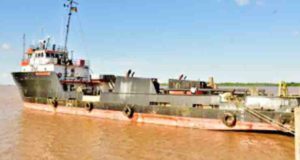
Officer Komal Singh
By Jarryl Bryan
Guyana is still reliant on Heavy Fuel Oil (HFO) despite plans to transition to renewable energy. But one industry stakeholder, with a background in both shipping and oil, believes legislation to protect local waterways is sorely lacking.
Gaico Construction and General Services provides, among other things, oil spill response services. In an interview with Guyana Times Interview, the company’s Chief Executive Officer, Komal Singh spoke of the dangers of an oil spill and best practices around the world to prevent these occurrences.
“We have a lot of fuel transporting in our waterways,” he said. “And when you look at contingency plans and mitigating strategies when discharging or loading fuel, there are none. If there is a human error in terms of connecting a hose to a pipe, there (may not be) any booms around the vessels to contain it (the oil).
“So, by the time someone responds, it gone in the river. What we are pushing for, from a good corporate citizen standpoint, we want to see legislation to ensure that any vessel discharging or loading fuel should have booms around those vessels before such activities take place.”

Because of its composition, oil floats on top of the surface of water. A boom is a flotation device that surrounds a vessel and/or, in the case of an oil spill, surrounds the spill. It is deployed using a boom reel, in much the same way a fishing reel works.
Singh explained that the Demerara River flowed at approximately five knots per hour, a rate he described as very fast. He noted that if oil were to spill without being contained, it would likely spread quickly in the River.
The CEO also explained that some persons were transporting HFO in single-hull vessels. He cited the example of the Valdez oil spill, which occurred in 1989 when oil tanker Exxon Valdez struck a reef off the Alaskan coast and spilled millions of gallons of crude oil. It is widely considered as one of the worst man-made environmental disasters.
“We have wreckage in our river. And in moving fuel oil in single-hull vessels, it means fuel is going in and storing in a compartment and if that compartment punctures, the fuel will disappear out of the tank. Now the US has banned the use of single-hull vessels, since the Valdez spill. All vessels carrying fuel must be double hull. It means there is a separation between the (compartments).
“Our issues are right in our backyard … we need to have legislation to push stakeholders dealing with fuel to use double-hull vessels. Imagine one of those vessels moving 3000 barrels of fuel oil, and it runs into a wreck under the water and it spills. You don’t want to imagine the amount of area 1000 barrels of fuel oil can cover and shut down. Imagine you have a spring tide! We’re hoping legislation will pass to fix (these) things.”
Oil spill services
Gaico’s oil spill services were launched in 2016, when President David Granger commissioned what would be Guyana’s first oil spill response operation service at the Gaico Wharf at Nismes, West Bank Demerara.
It was set up as a pre-emptive measure against possible spillage once oil and gas production commenced in the future. Asked for an update on the operations, Singh said that the service regularly engaged staff in training exercises. He noted that they were put through rigorous training sessions to sharpen their ability to handle real-life situations.
“Gaico is still very active in oil spill response. We’re continuing training in house with our employees. We have another training scheduled for January. And all our training we do is done in the Demerara River, so the guys get the feeling of how a boom that one guy can pull on land, how it gets difficult in the water, where you need six or seven men and a boat to pull it due to water pressure,” the CEO explained.
With oil production expected to begin soon in the Stabroek block, a study was done last year by the Environmental Protection Agency (EPA) on the matter. It had found that while an oil spill was possible, factors such as the location of Exxon’s subsidiary Esso Exploration and Production Guyana Limited (EEPGL) operations combined with the region’s water temperature would minimise the effects.
There is also a draft National Oil Spill Contingency plan, for which public consultations were held earlier this year. It was reported last month that the EPA had commenced a review of the document.



